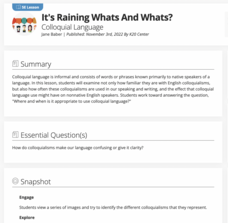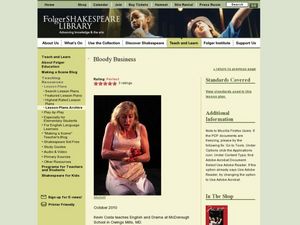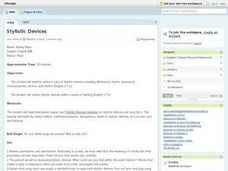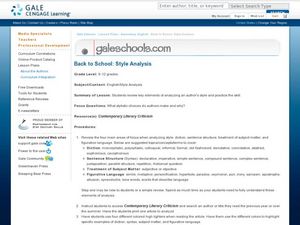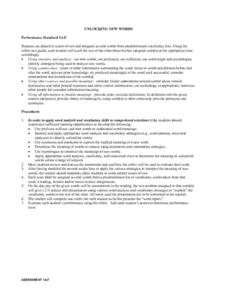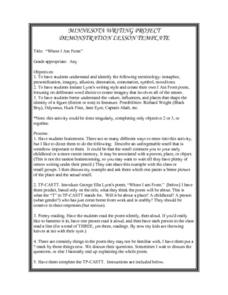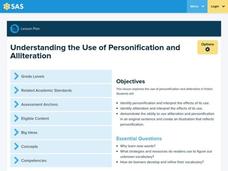K20 LEARN
It’s Raining Whats and Whats? Colloquial Language
"Yuns betta outten the lights!" Colloquial language is the focus of a lesson that asks middle schoolers to consider the pros and cons of using idioms. They read articles, match expressions with their meaning and place of origin, and...
K20 LEARN
Is Pizza Epic? Word Choice
Remember when everything was Fantastic! Fabulous! Awesome! Iconic! A series of activities encourages young writers to move beyond these overused descriptors and instead choose a more precise language.
Texas Education Agency (TEA)
Reference Guides (English III Reading)
An interactive resource introduces users to dictionaries, glossaries, and thesauri and the significant differences among these reference guides. Users learn which reference is best for which kind of search, examine sample entries from...
Texas Education Agency (TEA)
Drawing Conclusions Based on the Sufficiency and Strength of Research (English III Reading)
High school juniors learn how to construct a strong argument by crafting a claim and using neutral language backed by evidence from reliable sources. To do so, they learn to evaluate sources and evidence to support claims. They then...
Curated OER
Bloody Business
Students research word frequencies in Macbeth and create a frozen picture inspired by a word. For this Macbeth lesson, students view Blood Will Have Blood and discuss the dual meaning of the word "blood." Students identify five major...
Curated OER
Stylistic Devices
Pupils review connotation and denotation and stylistic devices in poetry. They read the lyrics to a song as it is being played and then discuss the meaning of the song. As a class, students read poems, share their thoughts, and define...
Scholastic
Choose Your Words Wisely (Grades 9-12)
Words, words, words. The function of words in persuasive writing is the focus of a group activity that asks members to analyze how words advertisers use are designed to influence targeted audiences.
K12 Reader
Winter Adjectives: Shades of Meaning
Is wet damper than soggy? Young grammarians consider shades of meaning by ranking a set of winter adjectives from the weakest to the strongest.
Curated OER
Incorporate an Aspect of Environmentalism into an Essay Writing Curriculum
Students listen to a brief explanation of the meaning of denotation and connotation and engage in discussion of the word conservation incorporating both denotations and connotations of the word. They outline the consequences of our...
Curated OER
Back to School: Style Analysis
Jump back into expository writing and analysis at the start of a new school year! Start with a review of an authors' stylistic choices in diction, syntax, treatment of subject matter, and figurative language. Writers choose a text to...
Shakespeare Uncovered
Henry IV, Part I: Does Father Know Best?
“Yea, there thou mak’st me sad and mak’st me sin/In envy that my Lord Northumberland/Should be the father to so blest a son--.” Henry IV, Part I, provides the text for a series of exercises that ask class members to examine the...
Curated OER
Poetry: Basic Elements of a Poem
People who pen poetry positively need to know basic tenets and terms of poetry, like alliteration and consonance, for example. These and other terms are define and illustrated. Then viewers are given an object and asked to craft a...
Curated OER
Unlocking New Words: Partner Presentations
Following extensive modeling about how to apply word analysis and vocabulary skills to learn new words, partner teams create brief word presentations to teach new vocabulary to the class. Preselect words from upcoming social studies,...
Mr. Ambrose
The Great Gatsby, F. Scott Fitzgerald
Good discussion questions, quizzes, and tests teach as well as assess. Readers of The Great Gatsby will learn much from the materials in a 36-page packet designed to help students prepare for the AP Literature exam. Included in the...
Curated OER
Elements of Poetry
Prepare your learners to identify figurative language in poetry. Tips for reading poetry and what to look for are listed on these slides. Rhetorical devices are defined and plenty of examples are given.
Schools United to Provide Enhanced Resources Network
AP English Project: Journal of Literary Terms and Devices
To prepare for the AP English exams, individuals are asked to create a notebook of literary terms and devices. The terms must be defined, accompanied by representative artwork, and illustrated by an example drawn for a named source. A...
Curated OER
Poetic Elements
Poetry is all about sound and rhythm. The sound of the words, the rhythm of the lines, and the emotional atmosphere created by these elements and the literary devices poets use, compress whole stories into a few stanzas. The specialized...
Curated OER
Where I Am From
Learners study selected poetry to gain an understanding of influences on values and personal identity. They explore language terms such as personification, imagery metaphors and allusion. After reading a poem and discussing it,...
Curated OER
English Vocabulary Skills: AWL Sublist 8 - Exercise 1c
For this online interactive English vocabulary skills worksheet, students answer 10 matching questions which require them to fill in the blanks in 10 sentences. Students may submit their answers to be scored.
Curated OER
Review of Literary Devices
Sixth graders review literary devices. They use both fiction and nonfiction texts to review metaphor, simile, alliteration, imagery, symbolism and personification. This lesson has a scripted guide for the teacher to follow.
Curated OER
Review of Personification and Alliteration
Students review personification and alliteration. In this literary devices lesson plan, students use personification and alliteration in a sentence. Students draw a picture reflecting personification.
Curated OER
Metaphor
High schoolers identify the distinction between literal and figurative language with a focus on metaphors. They complete a metaphor analysis chart, then practice expanding metaphors by composing their own comparisons of elements of the...
Curated OER
Eng 312: Midsemester Exam
Using the text Language Awareness by Eschholz, Rosa and Clark, as well as previous lectures from the class, this slideshow presents students with a midterm addressing key terms and concepts. While teachers might have a hard time using...
Curated OER
Eng 312: Final Exam
When paired with other powerpoints by Don L.F. Nilsen, this final exam covers topics addressed throughout previous lectures (slide 14 specifies which lectures should be reviewed). Teachers could use this presentation to craft their own...
Other popular searches
- Connotation and Denotation
- Connotation Denotation
- Connotation vs. Denotation
- Connotation vs Denotation
- Connotation, Denotation
- Connotation Denotation Ppt
- 113 Connotation Denotation
- Connotation Denotation Pot
- Connotation/denotation


